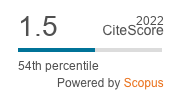Sustainable Development Of Tourism – EU Ecolabel Standards Illustrated Using The Example Of Poland
DOI:
https://doi.org/10.1515/cer-2016-0016Keywords:
tourism, economy, sustainable developmentAbstract
Tourism, as one of the biggest and fastest growing industries in the world, has an enormous impact on the achievements of the Europe 2020 growth strategy. The main factor influencing its effectiveness, based on achievement of strategy indicators, is tourist infrastructure, which is understood as hotel and restaurant facilities used by tourists coming to a particular area to meet their needs associated with passive and active tourism. To achieve the highest effectiveness in this regard, the European Union has established the scheme of Ecolabel standards, implemented in individual countries through independent certification, compliance with which means that the strategy’s assumptions can be effectively implemented. According to experts, managing a facility in compliance with Ecolabel standards today is an example of innovative hotel management. In addition to the benefits resulting from taking care of the environment, the certification also allows for a reduction of the operating costs of a facility. This paper aims at verifying – through an econometric model – research hypotheses related to the reduction in operating costs of a facility that complies with the certification standards.
Downloads
References
Dziuba R. (2013), Możliwości wdrożeniowe założeń hotelu ekologicznego na przykładzie certyfikatu „Czysta Turystyka” w regionie łódzkim. Częściowe wyniki badań. [in:] ʻPolityka zrównoważonego i zasobooszczędnego gospodarowaniaʼ, Prace Naukowe Uniwersytetu Ekonomicznego we Wrocławiu; Wrocław No 318/2013.
Google Scholar
Fundacja Partnerstwo dla Środowiska,www.fpds.pl (2014).
Google Scholar
Instytut Turystyki w Krakowie (2011) Ekologia w turystyce jako tendencja rozwoju gospodarki XXI wieku, ISBN:978-83-919364-3-0 Kraków.
Google Scholar
Komisja Europejska, Decyzja 2009/578/WE, ustalająca ekologiczne kryteria przyznawania wspólnotowego oznakowania ekologicznego usługom zakwaterowania turystycznego.
Google Scholar
Ministerstwo Sportu i Turystyki RP, Wspólnotowe oznakowanie ekologiczne – ecolabelling, www. msport.gov.pl/ (2014).
Google Scholar
Polskie Centrum Badań i Certyfikacji S.A. www.pcbc.gov.pl, (2015).
Google Scholar
Światowa Organizacja Turystyczna UNWTO, Przyszłość Turystyki 2020, www.unwto.org (2015).
Google Scholar
Światowa Organizacja Turystyczna UNWTO. International Tourism: First results of 2011 confirm consolidation of growth, www.unwto.org (2015).
Google Scholar
Train to Ecolabel www.traintoecolabel.org (2015).
Google Scholar
UNESCO Sustainable tourism www.unesco.org (2015).
Google Scholar
Wysokińska Z., Witkowska J. (2010), Integracja Europejska. Zrównoważony rozwój w Unii Europejskiej, PWN, Warszawa.
Google Scholar
Wysokińska Z. (2011), Konkurencyjność w międzynarodowym i globalnym handlu technologiami. PWN Warszawa–Łódź.
Google Scholar
Downloads
Published
How to Cite
Issue
Section
License

This work is licensed under a Creative Commons Attribution-NonCommercial-NoDerivatives 4.0 International License.











